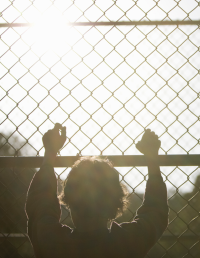Landmark settlements mark a turning point in the treatment of children in immigration custody
Agreements significantly expand the rights of three classes of youth
OAKLAND, CALIFORNIA — Today, the National Center for Youth Law, the Center for Human Rights and Constitutional Law, UC Davis Immigration Clinic, and Cooley LLP announced three major settlements in Lucas R. v. Becerra, their 2018 case challenging the federal government’s unconstitutional treatment of children in immigration custody.
The three groundbreaking settlements significantly expand the rights of three classes of youth in immigration custody: youth with disabilities, youth prescribed psychotropic medication, and youth seeking assistance from legal counsel. Together, these agreements represent a fundamental shift in how the federal government treats these young individuals, ensuring they receive the services and support mandated by law, while also caring for their well-being.
Mishan Wroe, Senior Attorney at the National Center for Youth Law, expressed gratitude to the courageous young people who initiated this litigation, stating, “Our named class members, and many young people like them, faced discrimination that kept them from their loving families and inflicted psychological harm. They have steadfastly pursued justice and an end to this discrimination for years, and we are thrilled today to share this victory with them and with all youth in federal immigration custody.”
Key details of the settlements unveiled today include:
- The Disability Settlement: This settlement compels the government, for the first time, to identify and track youth in its custody with disabilities. It mandates the provision of evaluations for hospitalized youth, those considered for more restrictive placements, and those requesting disability evaluations. It also requires the creation and implementation of service plans to ensure that youth can fully engage in programs, with no unnecessary delays in family reunification due to a youth’s disability. Additional support and services must be offered to prevent youth with disabilities from being placed in restrictive placements.
- The Psychotropic Medication Settlement: This agreement requires the government, for the first time, to follow an informed consent protocol, ensuring that youth and their families can meaningfully participate in the consent process. It also requires informed consent from a youth, parent, or authorized consenter before administering psychotropic medication, and monitoring and external review must be provided for youth prescribed multiple medications or medication at high dosages.
- The Access to Counsel Settlement: This settlement ensures that youth have unobstructed access to attorneys, particularly as they navigate issues related to their placement, release, and the administration of psychotropic medications. The government will also be required to provide attorneys with necessary client documents within specified timeframes.
Holly Cooper, Co-Director of the Immigration Law Clinic at UC Davis School of Law explained, “It is imperative that immigrant children meaningfully understand the type of medication being administered and that disabled children are identified and treated with dignity. Today’s settlements are a giant step forward to ensuring that detained immigrant children receive procedural protections, access to counsel, and understand their medical treatment options.”
“These settlements solidify critical protections for youth in federal immigration custody. In addition to protecting their health and safety, these settlements provide youth with the ability to defend these legal rights,” said Summer Wynn, partner at Cooley. “Cooley is honored to have represented these youth and played a role in securing these important advancements.”
BACKGROUND
In November 2018, the National Center for Youth Law, the Center for Human Rights and Constitutional Law, UC Davis Immigration Clinic, and Cooley LLP filed Lucas R. v. Azar, which alleges violations of rights afforded to unaccompanied immigrant children under the U.S. Constitution, federal statutes, and the Flores Settlement Agreement.
The case seeks to deepen and expand protections for five separate classes of the most vulnerable children in custody, including: children with disabilities, children that get stepped up to more restrictive facilities, children who are not promptly released to sponsors, children who are administered psychotropic medications, and children whose lawyers are obstructed from comprehensive representation. In November 2022, the Court entered a preliminary injunction that protected the due process rights of two of the classes: children placed in restrictive facilities and children denied release to their sponsors. The settlements announced today will resolve the remaining issues in the litigation.
For more information on the case history and to review the settlement agreements regarding children’s disability rights, psychotropic medication rights, and access to counsel rights, please visit: https://youthlaw.org/cases/lucas-r-v-azar



